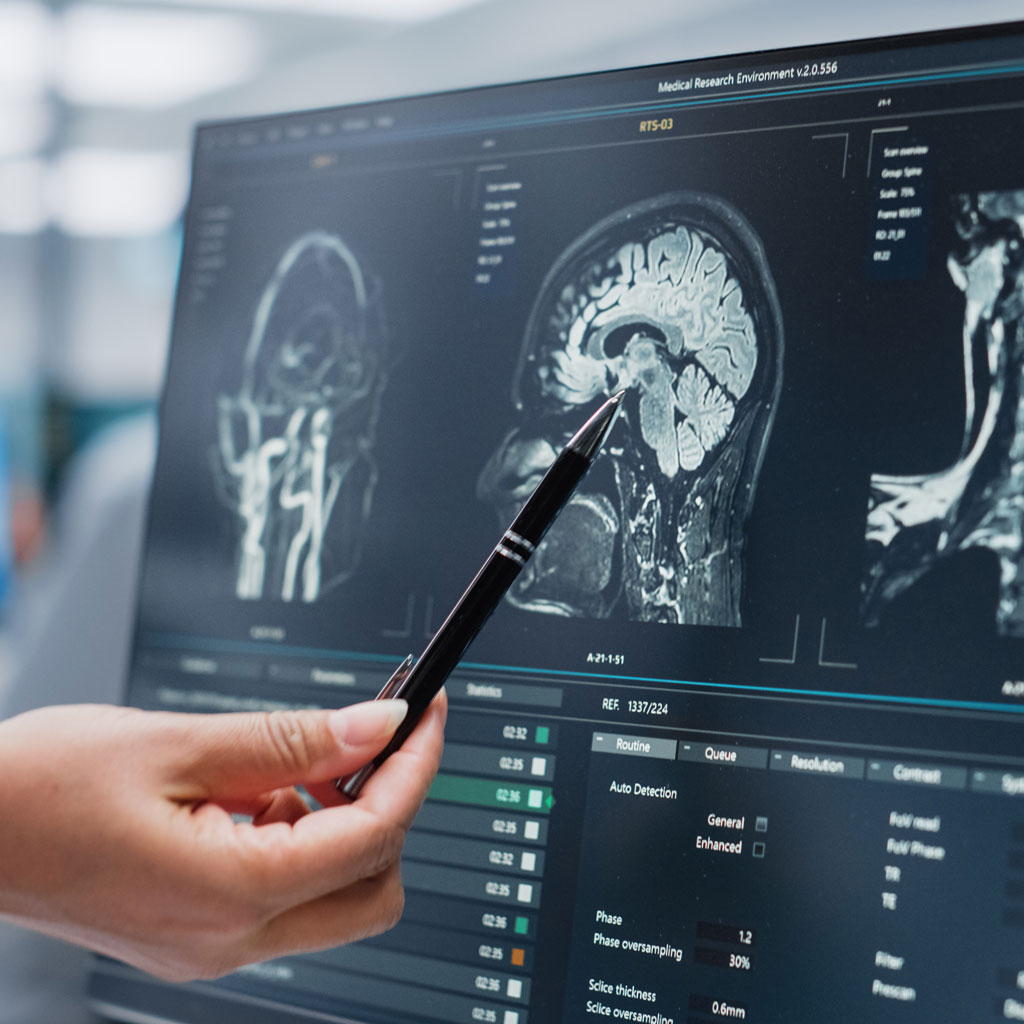We offer this service at the following locations:
Diagnostic neuroradiology deals with the imaging diagnosis of diseases and changes in the central nervous system (CNS, i.e. the brain and spinal cord). There are also close anatomical and thematic links with diseases from the ENT medical, dental and oral surgery and ophthalmological spectrum.
At the RZM we offer the complete spectrum of neuroradiological sectional imaging diagnostics. This is primarily carried out using MRI (magnetic resonance imaging) and CT (computer tomography).
In addition to routine neuroradiological examinations, we offer specialised examinations, individually tailored to the respective problem. Here is a selection of MRI examinations:

MRI skull examinations
- High-resolution CISS or SPACE MRI to visualise the structures of the inner ear for special dizziness investigations.
- Diffusion imaging for questions about cholesteatoma (recurrence)
- Visualisation of the cranial nerves in cases of unclear facial pain or trigeminal neuralgia
- High-resolution, structural (3T) MRI for epilepsy
- Susceptibility-weighted MRI in cases of trauma (consequences)
- MR neurography of the cervical and lumbar nerve plexus
- High-resolution MR angiography in the case of brain bulges or aneurysms (also in follow-up care after treatment, e.g. coiling, WEB or flow diverter treatment)
- Time-resolved MR angiography for suspected vascular malformations (e.g. unclear ringing in the ears) in the head and neck region
- High-resolution MRI in the clarification of dementia syndromes (impaired memory, concentration disorders)
- High-resolution visualisation of the basal ganglia in movement disorders (e.g. Parkinson’s disease)
- Many years of experience in dealing with (neuro-) paediatric issues and diseases (beware: from the age of 5 and under examinations under sedation are NOT carried out)
MRI spine examinations
- State-of-the-art imaging of the spinal cord and intervertebral discs
- High-resolution CISS / SPACE MRI for the visualisation of dura or brain injuries (e.g. following a traffic accident)
- Dynamic and high-resolution spinal MR angiography for vascular malformations, unclear hemorrhages, or for post-treatment air monitoring
- High-resolution 3D (myelography) imaging of the spinal nerves for precise intervertebral disc diagnostics
Additional services
High-resolution imaging of the white and grey matter of the brain with the option of additional computer-aided analysis to evaluate the following questions:
- Accurate determination of lesion load and progression in multiple sclerosis (MS)
- Algorithm (AI)-based calculation of individual brain volume in the case of cognitive deficits, e.g. dementia.
If you or your referring doctor have any questions about a specific examination or disease, please do not hesitate to contact us.
Basic information on neuroradiology at the Radiology Centre Munich
“Neuro” is a word formation element that precedes medical terms. “Neuro” comes from the Greek and always indicates that it refers to topics relating to the nerves/nervous system. Examples include neuroleptic (a drug that affects the autonomic nervous system), neuropsychology (issues relating to brain functions such as thinking, attention, memory, speech or motor skills), neurology (the science of the structure and function of the nervous system and a medical specialty that deals with nervous diseases), neurons (nerve cells) or – as in our case – neuroradiology (diagnosis of diseases/changes in the central nervous system).
The categorisation of the nervous system into “central” and “peripheral” is based on the location of the nerve cells in the body. As the name suggests, the central nervous system (CNS) is located in the centre of the body. It comprises the brain and spinal cord. The central nervous system controls all unconscious processes of the body such as organ function, respiration, digestion and metabolism. It is also responsible for thinking, feeling and memory.
The nerve structures outside the spinal cord and brain – for example the nerves in the arms and legs – belong to the peripheral nervous system (PNS). The corresponding nerve fibres have the task of supplying the brain and spinal cord with information from the body and the environment.
This means that while the two systems appear spatially separated from each other, they can only function in unison. The PNS receives signals from the sensory cells and transmits them to the CNS. This processes the signals.
Neuroradiology is concerned with the diagnosis of diseases and changes in the nervous system. It provides a precise insight into the human brain as well as the central and peripheral nervous system. With the examination options at our Radiological Centre Munich, we cooperate with your treating neurologist. We also work closely with neurosurgeons. Our examinations also support neuropaediatricians and psychiatrists in their work.
Here you will find an overview of neurological diseases for which an examination at our Radiological Centre Munich can be the first step towards successful treatment:
Seizure disorders (epilepsy)
These are usually pathological, unregulated electrical discharges that occur, for example, in the grey matter of the cerebral cortex and interrupt normal brain function. This process can lead, e.g., to impaired consciousness, epileptic seizures, narcolepsy or syncope.
Movement disorders
If the so-called basal ganglia in the brain are disturbed, the body involuntarily performs automatic movements. In this context, it is also possible that the movements can be carried out much less precisely than usual. This includes diseases such as Parkinson’s, tremor disorders, gait disorders, restless legs syndrome and tics.
End plate disorders (motor neurones)
The motor endplate is the contact point between a nerve and muscle cell. If there are changes here, neurological problems can occur. Possible conditions in this context include myasthenia, channelopathies or Lambert-Eaton syndrome.
Inflammatory diseases of the central nervous system
Inflammations such as meningitis can be caused by pathogens such as bacteria, viruses or fungi. However, there are also inflammatory diseases that are autoimmune in nature. These include, for example, multiple sclerosis or myelitis.
Headaches and facial pain
There are many factors that can cause headaches and pain in the face. These include neurological problems such as migraines, cluster headaches or trigeminal neuralgia.
Infections of the central or peripheral nervous system with neurotropic pathogens
Bacteria, viruses or parasites are also known as neurotropic pathogens. They can cause diseases of the nerve tracts in the brain and spinal cord as well as the nerves that leave the brain or spinal cord. Typical diseases in this area are encephalitis or neurotuberculosis.
Nerve pain
They are particularly severe and often lead to neurological deficits such as sensory disturbances or numbness. Typical nerve pain often occurs as part of carpal tunnel and tarsal tunnel syndrome, nerve root pain, neuropathies, intervertebral disc diseases or trigeminal neuralgia.
Neurodegenerative diseases
Basal ganglia diseases, forms of dementia, Parkinson’s disease or amyotrophic lateral sclerosis (ALS) can lead to a progressive loss of nerve cells with corresponding symptoms and complaints.
Polyneuropathies
If several peripheral nerves are damaged, this can lead to discomfort, sensory disturbances and pain in the areas supplied by certain nerves. Polyneuropathies can be chronic or acute. They can occur, for example, as a result of diabetes, inflammation, poisoning or nutrient deficiency.
Spinal cord syndromes
Damage to the spinal cord, e.g. due to a fall or other type of trauma, can result in paraplegic symptoms. In addition to restricted movement, this also includes neurogenic bladder and bowel dysfunction, etc.
Stroke
A stroke is a sudden circulatory disorder in the brain. The so-called apoplexy can lead to the death of brain cells, resulting in permanent paralysis or speech disorders.
Dizziness
Neurological diseases can cause positional vertigo or similar.
Metabolic disorders of the nervous system
Genetic abnormalities of enzymes or a lack of cofactors can cause impaired development or function of the nervous system. Typical so-called neurometabolic diseases are, for example, Fabry’s disease or Pompe’s disease.
Tumour diseases of the central and peripheral nervous system
Neurological disorders and deficits can be caused by tissue growths in the brain and spinal cord as well as on the sheath structures of the nerve fibres. In the case of benign or malignant tumours, neuroradiology at our locations in Munich and the surrounding area can provide important information.
At our Radiological Centre in Munich, we carry out MRI and CT examinations as part of our neuroradiology services. The aim is to detect pathological changes in the brain and spinal cord as well as vascular constrictions as early as possible. The examinations are also necessary for the diagnostic work-up of unclear neurological symptoms. We can use the instruments of neuroradiology to carry out a precise diagnosis of tumors and inflammations in the head, face and neck area. MRI and CT at our locations in Munich are ideal for monitoring therapy in chronic diseases of the nervous system and for focal searches in epilepsy.
Neuroradiology in Munich is able to visualise diseases of the spine and spinal cord using MRI and CT. CT allows us to optimally examine the bony structures. Due to its better soft tissue contrast, MRI is ideal for diagnosing herniated discs, tumours and inflammatory diseases.
Angiography (possibly with the administration of contrast medium) enables us to visualise constrictions, stenoses and aneurysms of the vessels supplying the brain as well as arterial short-circuit connections. With CT or MRI angiography, we can also carry out follow-up checks after endovascular interventions.

